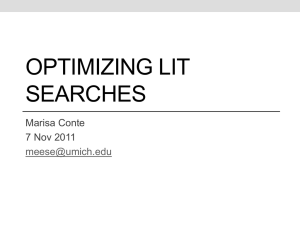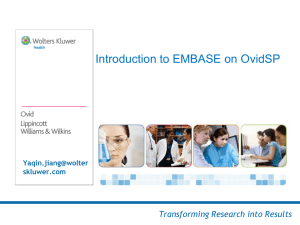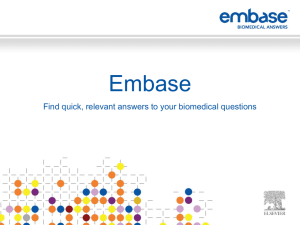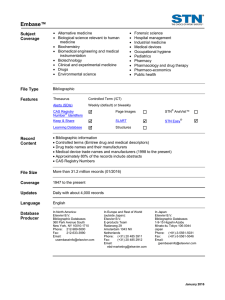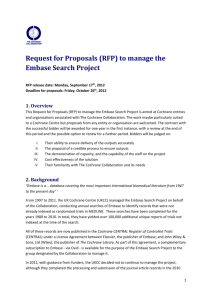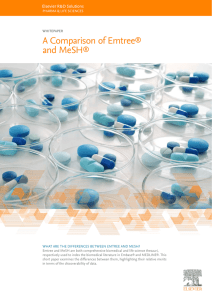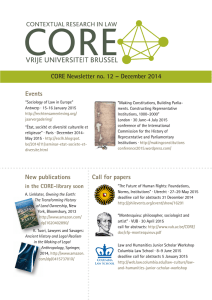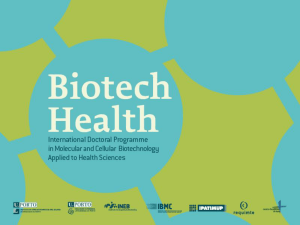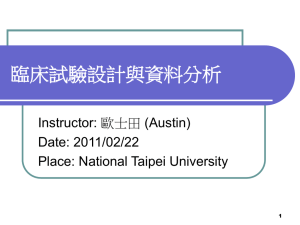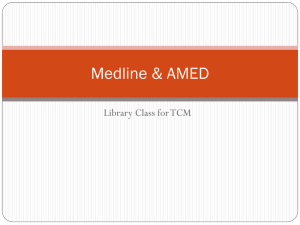Embase for medical schools
advertisement
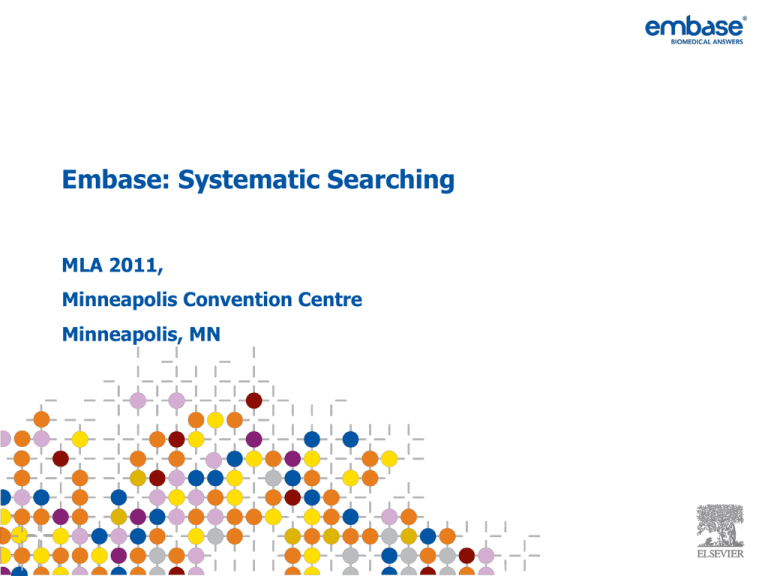
Embase: Systematic Searching BLITS: Getting the Best MLA 2011, fromConvention Centre Minneapolis EMBASE.com Minneapolis, MN Planning a Systematic Review Planning the search strategy and process in advance helps you to: • Systematically retrieve the maximum number of highly relevant references • Extract the available evidence 2 A checklist may be used to review the search or used to help set up a well planned search Reviewing Search Strategies • Checklist is taken from: Jessie McGowan, Margaret Sampson, Carol Lefebvre. An Evidence Based Checklist for the Peer Review of Electronic Search Strategies (PRESS EBC). Evidence Based Library and Information Practice 2010;5(1):149-54. • The following article also helped inspire this presentation: Sampson M, McGowan J, Cogo E, et al. An evidence-based practice guideline for the peer review of electronic search strategies. Journal of Clinical Epidemiology 2009 (Sep); 62(9): 944–952 4 Choosing your database There is some evidence of added value in searching Embase, as well as MEDLINE, for studies for inclusion in systematic reviews, as the additional studies identified contribute to the overall findings of the review; this may be attributed in part to the greater coverage of some languages other than English in Embase. Lefebvre C, Eisinga A, McDonald S, Paul N. Enhancing access to reports of clinical trials published world-wide – the contribution of EMBASE records to the Cochrane Central Register of Controlled Trials (CENTRAL) in The Cochrane Library. Emerging Themes in Epidemiology 2008;5:13. Embase Content Overview Emtree: Biomedical thesaurus, over 60k terms 1947 1950 1974 2009 Embase: Fully indexed: Over 7,700 journals, 1974- MEDLINE: 2,500 journals unique to Embase, mapped to Embase indexing, 1950- (including MEDLINE Classic) Embase Classic: Digitally scanned and re-indexed, 1947-1973 AIP and In Process: Indexing added, from 2009 Conference Abstracts: Indexing added, from 2009 Unique content in Embase Presented by Carol Lefebvre MLA 2010 • ‘Embase is a rich source of reports of randomized trials that are either not included in MEDLINE or not indexed as trials in MEDLINE, especially reports in some languages other than English’. • ‘In addition to searching CENTRAL, people looking for reports of randomized trials should search Embase, as well as MEDLINE, for reports published in recent years that have not yet been considered for inclusion in CENTRAL’. Ref: Lefebvre et al. Emerging Themes in Epidemiology 2008 5:13 Embase vs MEDLINE Randomized controlled trials Language Embase Medline Embase advantage Turkish 613 75 538 717% Korean 134 46 88 191% Portuguese 712 442 270 61% Dutch 606 442 164 37% Chinese 5366 3945 1421 36% Polish 491 434 57 13% Spanish 2316 2137 179 8% French 3952 3904 48 1% German 8393 8566 -173 -2% Percent Search date: 14 June 2010 Conferences • 2009 – Elsevier started indexing conference abstracts in Embase • Currently nearly 400K conference abstracts in Embase from 1K conferences • Each abstract is searchable using Emtree • Currently adding nearly 1K abstracts per day • from journals and journal supplements published in 2009/2010/2011 • Conference abstracts are not in MEDLINE • In BIOSIS for 2009/2010: “less than 165,000 records, of which just 11% have online abstracts” • See http://www.embase.com/info/what-isembase/coverage for more information Sample Review Question Are there any risks associated with the administration of antibiotics together with digoxin in a patient with congestive heart failure who has contracted pneumonia? 12 Emtree (from Jan 2011) • 60K preferred terms (more than 28K drugs and chemicals, including all generic names recognised by FDA, EMEA and WHO from 2000) • >260,000 synonyms (>172,000 drugs and chemicals) • 7,500 explosion terms (that define the hierarchical structure) • 78 subheadings (64 drug and 14 disease subheadings) • 14 study types including Randomised Controlled Trial, Systematic Reviews and the NEWLY introduced Diagnostic Test Accuracy Study • Links to over 21,000 CAS registry numbers • All MeSH terms are included • Updated 3 times a year (from 2011) Benefits of Emtree • • • • • • • • Easy to search for terms and all synonyms Comprehensive drug searching Up-to-date Explosion (tree) searching Polyhierarchical structure Natural language terminology Inclusive terminology Review www.embase.com/info/emtree for more information Start with Emtree Find subject headings for your search Click here to search further in an Embase search form. Click “nn Records” link to perform an explosion search, if applicable. 15 Reviewing an Emtree term Consider the term’s History Take note of any Synonyms listed Look at the CAS registry number(s) displayed Read the entry provided from Dorland’s dictionary, when available 16 Emtree Term History • If your term has not always existed in Emtree (this is after 1974), then perform a Field search of Article title (:ti) using your term • Review the Emtree terms in your retrieved records and consider adding these subject headings to your search strategy • Review the abstracts to identify any alternative expressions used by authors to add as additional free text search terms. 17 Free-text Term Searching Perform a free text search for the Emtree term and all synonyms in the title and abstract fields. 18 Search unique fields Include the Drug trade name (:tn) field with the Article title and Abstract fields, where appropriate Include the CAS registry number (:rn) displayed in the Emtree record, when available 19 Cannot find an appropriate Emtree term? • Perform a free text search in the article title field(:ti) using your term • Look through the resulting list of records and use “Add to Clipboard” link for any articles deemed relevant 20 Further tips for free text searching in Embase (Elsevier only) • Consider using truncation or wildcard characters (*, ?) • Proximity operators are supported such as NEXT and NEAR • When performing free-text searches, remember to consider variant spellings including British and American spellings and terminology o e.g., tumor vs tumour; diaper vs nappy; pediatric vs paediatric; otorhinolaryngology vs ear, nose and throat; overuse injury vs repetitive strain injury • Refer to www.trainingdesk.elsevier.com/embase and the Quick User Guide for more guidance 21 Filters The most common type of search filter is for specific study types, found in Filters on Session Results. Other filters may include publication type . 23 Diagnostic Test Accuracy Study •Definition: Used for original studies or systematic reviews which assess how accurately a test distinguishes humans or animals having a condition or disease from those who do not. Typically, the test under evaluation is called the index test and its results are compared to the results of the best. •Previously: Did not exist •From 2011: This is a new check tag and unique to Embase Embase study types • Go to http://pbt.up2els.com/sites/default/files/Embase%20chec k%20tags%202011%20(4).27April2011.pdf for a list of Embase study types and their definitions. Save Search and Email Alert 26 Coming in June 2011 Searches are saved with all steps of the strategy clearly visible. The user, can update and rerun saved search strategies Coming in August 2011: Editing your saved searches Saved searches can be edited, and changes previewed and accepted. When rerun, the result count will be updated Thank you! Contact us: http://embase.com/info/contact-us
